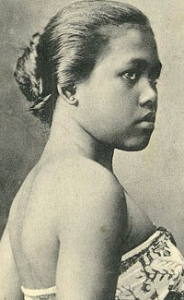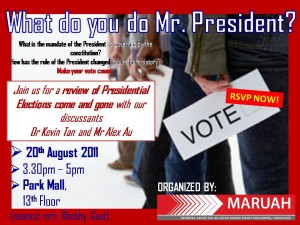This is an account of the talk A Short History Of Modesty In South-east Asia: From The Control Of Women’s Selves To Their Bodies, given by Dr. Farish Ahmad Noor, Senior Fellow at the S. Rajaratnam School of International Studies, NTU Singapore. This event was held on August 6, as part of Etiquette 2011, a multidisciplinary showcase of art, writing and film created by and about women.
by Lisa Li & Zarina Muhammad

Sixty people at the Substation are listening to Dr Farish Noor talk about armpits…
A woman dressed in a singlet reaches up for bananas, her armpits exposed to passers-by. Eyes are quickly averted, armpits censored. Onscreen, a message reads: “Do not wear tight and revealing clothes”.
This was part of a series of advertisements screened by Malaysian TV station 8TV during the recent month of Ramadan, urging Malaysians to maintain good standards of public decency. Eventually, a huge public outcry led to the removal of these advertisements.
When did an exposed armpit become the marker for public immodesty? Has this always been the case? If not, what was our ancestors’ understanding of the idea of modesty and morality?
Contrary to the modern-day perception of traditional conservatism, sensibilities in ancient South-east Asia were not necessarily defined by bodies or women. In fact, our ancestors often did not regard the body as ‘dirty’, or as a site to be policed.
Dr Farish Noor cited the example of penis-piercing for the enhancement of sexual pleasure, which was a regular practice up till the 8th century. The positive ideas and attitudes towards sex and sexuality in the ancient Kama Sutra also shaped the worldview of ‘greater India’, that is, present-day South-east Asia.
So, if public immodesty of the classical period was less linked to bodies and sexuality, what then were the markers for public modesty, and how was this influenced by the dominance of Hinduism and Buddhism?
Dr Farish Noor pointed to the two epic Hindu poems – the Ramayana and the Mahabharata – which he described as having given our ancestors the vocabulary to articulate and understand their moral and political landscape.
Of particular interest was the complexity in the representation of female figures in these texts – beautiful, ill-fated Draupadi in the Mahabharata, and strong-willed, loyal Sita in the Ramayana. In certain readings of these two texts, interestingly, the marker of modesty and morality appears to be the demonstration of one’s will in a public space and the woman’s individual actions, rather than her flesh and body.
So just when and how did modesty get transferred from self to the body?
Dr Farish Noor suggested that one factor was the 15th-century arrival of two Abrahamic religions – Islam and Christianity. To mark this change, the body then became the site to write the narrative of a new religion. 14th-century traveller Ibn Battuta described Asian women who went uncovered and free, but with the Islamization of South-east Asia, women started to cover up their bodies in order to outwardly display their conversion and changes in belief system.
The arrival of colonialism was another factor for this shift. With the British, Dutch and Portuguese expanding South-east Asian ports, the towns became predominantly young, single and male, and this was matched by the rise of prostitution of Asian women.
In these cities, racialized colonialism often kept the different races in separate quarters, partly due to the fear of what was then perceived as ethnic-specific diseases. Ironic then, that the different races met in the same brothels, and the prostitute became a vector for disease. Her body literally became the centre of public morality and scrutiny. It is also likely that ‘decent’ women were drawn into this scrutiny of women’s bodies, and strived to look clearly different from prostitutes.
At the same time, it became popular for European men to produce and purchase erotic postcards of nude African women for their private collections. It is unclear why there were no equivalent erotic postcards made of South-east Asian women.
Of course, things are not to be painted in simplistic terms. The notion of the woman’s body as a marker for public modesty continue to be shaped by different identities, representations and interpretations.
In the South-east Asian wars of the 20th century, for example, many women took on the identities of guerilla and freedom-fighter. And running counter to the ulama tradition of Islamic scholarship was Syed Sheikh al-Hady’s 1926 novel, the Hikayat Faridah Hanum – the first modern feminist novel written in vernacular Malay. Up until the 18th century, the Encyclopaedia Of Java was commonly used as a reference for matters related to sexuality and bodies, without any notion of immodesty.
What then do we make of contesting representations of women’s bodies and standards of modesty? And in a global culture that increasingly objectifies women’s bodies, yet polices them with the notion of public modesty, how much control do women have over both the display and the policing of their own bodies? And if our current conception of modesty is indeed a historical construct, is it possible to ‘de-gender’ or ‘de-body’ modesty?
Back to armpits. Should armpits be censored or not? It appears that people haven’t quite decided.
Lisa Li is a teacher and writer. Zarina Muhammad is a curator, writer, art historian, educator and the co-founder of Etiquette. Etiquette’s Visual Art Exhibition will be on at the Substation till August 28.












 In Singapore, the relationship between gender and technology goes largely unquestioned. While the digital revolution has been celebrated for creating wealth and empowering users, the relationship between gender and technology is generally not mentioned. Is this important? Does it matter that men still dominate science and technology fields?
In Singapore, the relationship between gender and technology goes largely unquestioned. While the digital revolution has been celebrated for creating wealth and empowering users, the relationship between gender and technology is generally not mentioned. Is this important? Does it matter that men still dominate science and technology fields?